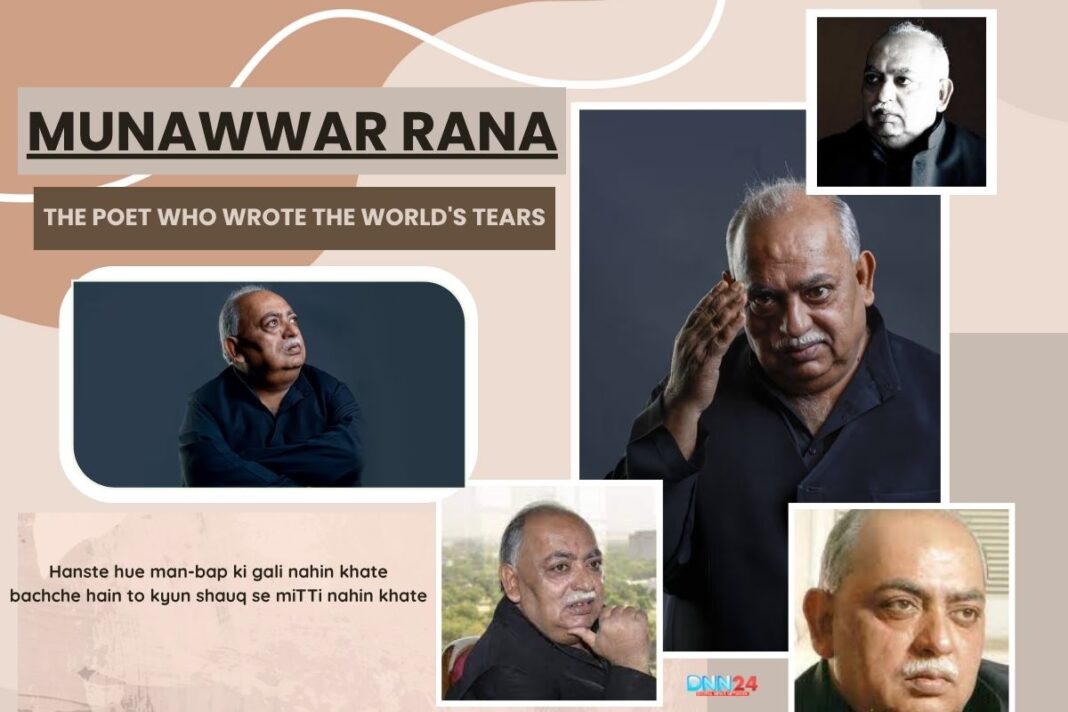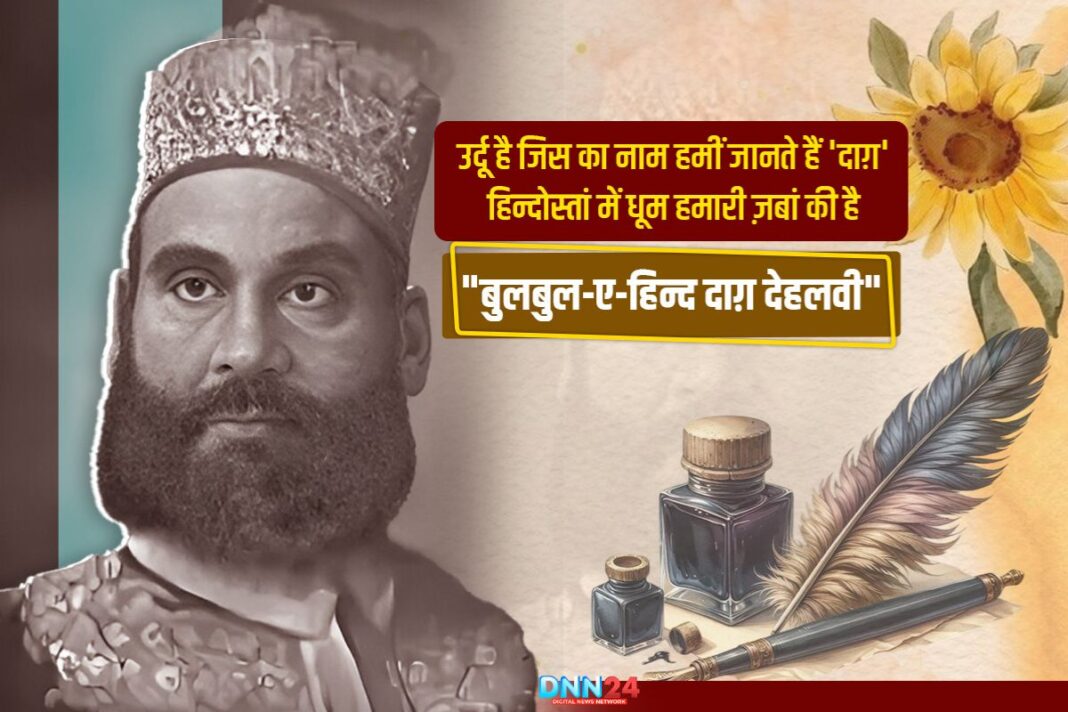Munawwar Rana stands as one of India’s most beloved Urdu poets, not merely for the beauty of his words but for the profound emotion and universality that marked every line he penned. He was born on November 26, 1952, in Rae Bareli, Uttar Pradesh, and his poetry served as a medium to unite millions of people across language, religious, and age boundaries. There was something of the simplicity of the most incredible power in his words, the simplicity that is the rarest gift of all, and that never comes to the heart through the medium of any scholasticism.
labo par uske kabhi baddua nahi hoti
Munawwar Rana
bas ek maan hai jo kabhi khafa nahi hoti
His most famous poem, “Maa,” made millions weep, laugh, and remember their mothers with renewed tenderness. Munawwar Rana’s journey transcended mere poetry; it was about life itself, painted with struggles, hope, and inspiration that resonated with ordinary people everywhere. He transformed personal suffering into universal salvation, so that each listener felt his poems were addressed directly to them. His legacy extends not just to the literary awards, but to the hearts he touched with his authentic voice of the human experience.
Is tarah mere gunaahon ko wo dho deti hai,
Munawwar Rana
maa bahut gusse mein hoti hai to ro deti hai
Childhood Roots: From Rae Bareli’s Soils to Kolkata’s Streets
Munawwar Rana’s life story begins in the small, bustling town of Rae Bareli in Uttar Pradesh, where his family chose to remain in India during the traumatic years following partition, despite many relatives migrating to Pakistan. This choice, made out of bravery and a strong sense of patriotism, would define him and his artistic vision to a great extent. His father, who had once commanded the respect of the zamindari, was reduced to nothing in the post-partition reshuffle but clung to their Indian roots with pride.
Maine rote hue ponchhe the kisi din aansoo
Munawwar Rana
muddaton maa ne nahi dhoya dupatta apna
Young Munawwar’s days were colored by both the warmth of a large joint family and the constant chill of financial struggle. Resilience was his everyday lesson when his family had to move to Kolkata due to hardships. There, amid the city’s bustling streets, kite-flying afternoons, and his father’s quietly brave pursuit to feed the family, Munawwar absorbed the varied hues of life—sometimes bright with hope, often shaded with longing. The boy who would later become India’s beloved poet learned his first lessons not from books, but from the university of life’s harsh realities and unexpected kindnesses.
Abhi zinda hai maa meri mujhe kuchh bhi nahi hoga,
Munawwar Rana
main jab ghar se nikalta hoon dua bhi saath chalti hai
The Mother in His Poems: “Maa” and the Universal Heartbeat
If you speak of Munawwar Rana, you must talk of “Maa,” not just his famous poem, but his entire philosophy of love and devotion. He transformed the ghazal, which had always been a song of romantic love, into a song for mothers everywhere. His lines, sewn with profound simplicity, struck the deepest chords of human feelings. The poem became more than literature; it was a breathing story of his childhood, where loss and love met every evening at his mother’s feet. She had been his protection in the face of poverty, her prayers had accompanied him everywhere he went, and her silences frightened him more than her wrath ever did.
jab bhi kashti meri sailaab mein aa jaati hai
Munawwar Rana
maa dua karti hui khwaab mein aa jaati hai
His poems about mothers caused people to cry about their mothers, and thus, a common language of motherly love emerged that transcended all boundaries. He created a new tradition where, on Mother’s Day, millions would quote his lines on social media, forever linking his poetry to the world’s most universal emotion. His genius lay in making the most private maternal bond feel like everyone’s shared experience, proving that the most profound personal truths often become the most universal ones.
aye andhere dekh le munh tera kaala ho gaya,
Munawwar Rana
maa ne aankhein khol di ghar mein ujaala ho gaya
The Tears on Stage and Life’s Hidden Chapters
When audiences saw Munawwar Rana at a mushaira, they witnessed more than just a poet; they saw a man whose eyes glistened with genuine tears, whose hand forever clutched a handkerchief, not as a theatrical gesture, but because his shayari was woven from the fabric of lived memory.
ishq hai to ishq ka izhaar hona chahiye
Munawwar Rana
aap ko chehre se bhi bimar hona chahiye
aap dariya hain to phir is waqt hum KHatre mein hain
aap kashti hain to hum ko par hona chahiye
Munawwar did not recite abstract verses about far-off muses like others did; he brought his whole life to the stage, a quavering voice, wet eyes, and a wide-open heart. His tears weren’t performance; each word reminded him of childhood days when his struggling mother would wipe his face, feed him morsels carved from her hunger, and pray for his safety through sleepless nights.
kisi ko ghar mila hisse mein ya koi dukan aai
Munawwar Rana
main ghar mein sab se chhoTa tha mere hisse mein maa aai
The audiences, which were often composed of poets who sought to be grand, would be reduced to mere listeners, spellbound by the subtle power of his sincere feeling. In one of the untold stories, his mother sold her only pair of gold earrings to ensure her children could eat well during her most challenging time. The poet later admitted that the suffering and the crushing love he experienced on that day became the timeless core of his poetry, transforming his suffering into the lines that would console millions.
bhula pana bahut mushkil hai sab kuchh yaad rahta hai
Munawwar Rana
mohabbat karne wala is liye barbaad rahta hai
agar sone ke pinjDe mein bhi rahta hai to qaidi hai
parinda to wahi hota hai jo aazad rahta hai
The Ghazal as Personal Diary: When Self Became the World
Munawwar Rana never believed in separating his pain from his poetry. When once asked why he never wrote about kings and conquests, he replied with characteristic honesty: “My ghazals are my autobiography, but I write them so everyone thinks they are their own stories.” He took the secrets and heartbreaks of his Kolkata years, the landlord’s humiliations, hunger’s persistence, a city’s initial coldness, and transformed them into poems that warmed even the hardest hearts. His celebrated work “Muhajirnama” emerged from his family’s partition sorrows, winning prestigious awards for capturing migrants’ heartbreak without bitterness or blame.
Muhajir hain magar hum ek duniya chhod aaye hain
Munawwar Rana
Tumhare paas jitna hai, hum utna chhod aaye hain
Kahaani ka ye hissa aaj tak sab se chhupaya hai
Ke hum mitti ki khaatir apna sona chhod aaye hain
Nayi duniya basa lene ki ik kamzor chahat mein
Purane ghar ki dehlizon ko soona chhod aaye hain
Aqeedat se kalai par jo ik bachchi ne baandhi thi
Woh rakhi chhod aaye hain, woh rishta chhod aaye hain
He composed nazms about his school life, and he did not write only on walls and chalk, but also on the particular smell of fear and hope that every financially challenged student takes into life. His genius lay in the fact that he saw that when personal truth is spoken with utter sincerity, it becomes universal truth. He once said at a literary gathering: “In ghazal, I take my own story and make it everyone’s story. That is why people cry when I recite, they are not crying for me, but for themselves.”
kabhi KHushi se KHushi ki taraf nahin dekha
Munawwar Rana
tumhaare baad kisi ki taraf nahin dekha
ye soch kar ki tera intizar lazim hai
tamam-umr ghaDi ki taraf nahin dekha
The Poet Who Returned the World Its Heart
To truly understand Munawwar Rana is to walk with him through Kolkata’s alleys, to sit beside him while he revised lines late into the night, to stand in his mother’s shadow as he found words for what the world cannot say. His extraordinary gift lay in making the most private sorrows feel universal and weaving the ordinary person’s heartbreak into lasting verse. He thought that a poet must be the mouthpiece of those whose tears are shed dry without ever being seen and heard.
miTTi mein mila de ki juda ho nahin sakta
Munawwar Rana
ab is se ziyaada main tera ho nahin sakta
dahliz pe rakh di hain kisi shaKHs ne aankhen
raushan kabhi itna to diya ho nahin sakta
Despite scandals and heartbreaks, such as the conflicts with his family over land and legacy, he went on to write, and he never lost faith in the power of words to heal and unite people, rather than divide them. His greatest lesson was the conviction that poetry, when honest, gentle, and full of genuine feeling, can either dry the world’s tears or, at minimum, share them for a little while.
thakan ko oDh ke bistar mein ja ke leT gae
Munawwar Rana
hum apni qabr-e-muqarrar mein ja ke leT gae
tamam umr hum ek dusre se laDte rahe
magar mare to barabar mein ja ke leT gae
Though Munawwar Rana leave this world in January 2024, his words continue to light lamps of hope in countless hearts. Whenever a child remembers a mother, a city loses a loved one, or a person feels lonely, his verses bring comfort and a sense of belonging, showing that real poetry will never die but live on inside the hearts it has touched.
baadshahon ko sikhaya hai qalandar hona
aap aasan samajhte hain munawwar hona
ek aansu bhi hukumat ke liye KHatra hai
tum ne dekha nahin aankhon ka samundar hona
sirf bachchon ki mohabbat ne qadam rok liye
warna aasan tha mere liye be-ghar hona
Also Read: Shehryar: The Poet of Dreams and Dusk
You can connect with DNN24 on Facebook, Twitter, and Instagram and subscribe to our YouTube channel.



